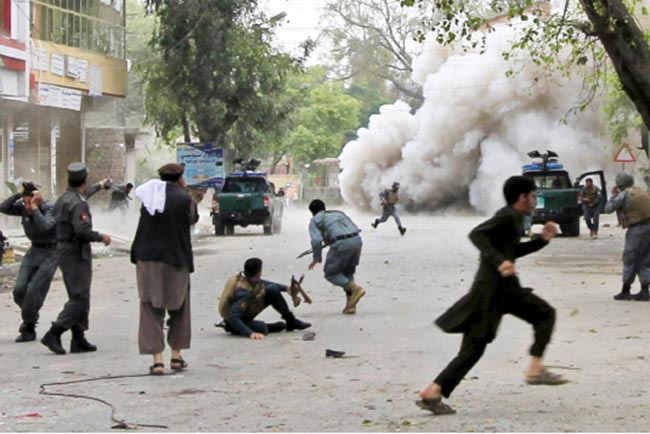Despite the fact that Afghanistan has suffered heavily as a result of horror and terror, the threat posed by terrorists will not be restricted within a particular geography. The fact has proved that terrorist groups extend their reach every day within Europe and America, which indicates that terrorism knows no limitation or boundary and will intensify in case of not being combated. On the other hand, there are concerns that the obstacles before their access to the weapon of mass destruction seem to be reduced.
The modern technology and access to modern products are mushrooming uncontrollably and it is feared that terrorists get access to destructive weapons without the support of states. Access to modern technological products has compounded the threat. With this fact, terrorists infiltrated safe places in Europe such as metro stations and daytime protected areas.
The shadow of terrorism spread fear beyond the center of crisis. Since terrorism is a global phenomenon, it needs to be reacted by all states. Currently, one cannot define terrorist as a certain military group with certain geography rather it is a network combining of groups and individuals locating in several countries and among different nations. The presence of some European citizens in the self-styled Islamic State in Iraq and Syria (ISIS) group is jaw-dropping for political analysts.
Although terrorists such as ISIS and the Taliban are operating as non-state groups, it does not necessarily mean that they are not in relation with people or completely lack state supports. Their equipment and military strategy reveal that their operations are engineered by strong intelligence and state supports. Despite the fact that some countries have defined their immediate interests in supporting terrorist groups, the international community will have to make those countries to change their policy in this regard and observe the principles of international law.
The more seriously the international community pursues this issue, the more easily it will persuade its backers to stop. The problem is that this demand has not been planned based on a common will.
However, nations expect that the international community should give the UN more important role in designing and implementing the anti-terrorist campaign. Otherwise, any countries in case of undertaking this responsibility will be affected by prevailing interests and policies. Therefore, a number of countries urge that the UN should play the greater role and the Security Council should take the necessary measures and military action against terrorism.
The philosophy behind the United Nation’s Charter is stated to be supporting the fundamental principles of human rights, dignity and human values and sustainable universal peace.
The United Nations created the Interim Terrorism Committee in 1972 for the first time through the General Assembly. Similarly, the Security Council issued the 8631 and 3731 resolutions in this regard following the 11 September.
In addition to condemning the terrorist attacks on the US, these resolutions introduced terrorism as a threat to international peace and security and recognized individual and collective defense for the United States.
The UN urged all countries to cooperate with one another to capture the organizers, supporters and perpetrators of these attacks. It was stressed in the resolution that anyone supported the perpetrators and organizers of 9/11 attacks financially or in any other ways, would be held responsible.
The UN urged the international community through the resolutions to strengthen their efforts to prevent terrorist acts by cooperating and fully implementing the Security Council’s international anti-terrorist conventions. The 3731 resolution also emphasized the fight against terrorist acts that endangered international peace and security in any way and with any means.
But the fact is that the UN has not implemented the issues stressed in resolutions regarding the countries supporting terrorism. The UN has neither fulfilled its responsibility about Pakistan which is said to support Haqqani network and other terrorist groups. Therefore, it is more likely that the UN and Security Council will not be able to fulfill their legal responsibilities and institutionalize sustainable peace at international level only through issuing resolution. Thus, the UN must launch a serious global effort to pursue and arrest terrorists and put pressure on their supporters.
In addition to putting pressure on supporters of terrorist groups, calling and facilitating Arab and Islamic countries in anti-terrorism campaign will be fundamental step that yet to be taken. The experience of Cold War suggests that any kinds of efforts for liberation should be accompanied by supporting the poverty-stricken countries financially and economically. To combat terrorism in a country such as Afghanistan, efforts should be made to provide economic assistance for the establishment of a stable political rule since poor countries are always susceptible to crisis and in need of double support of international community. The war in Afghanistan and Iraq has proved that the weakness of the post-crisis governments will make it possible for terrorist organizations to reinforce their terrorist acts through capitalizing on disorder.
Home » Opinion » Globalization of Terrorism and Strategies for combating it
Globalization of Terrorism and Strategies for combating it
| Syed Asif Hussaini

